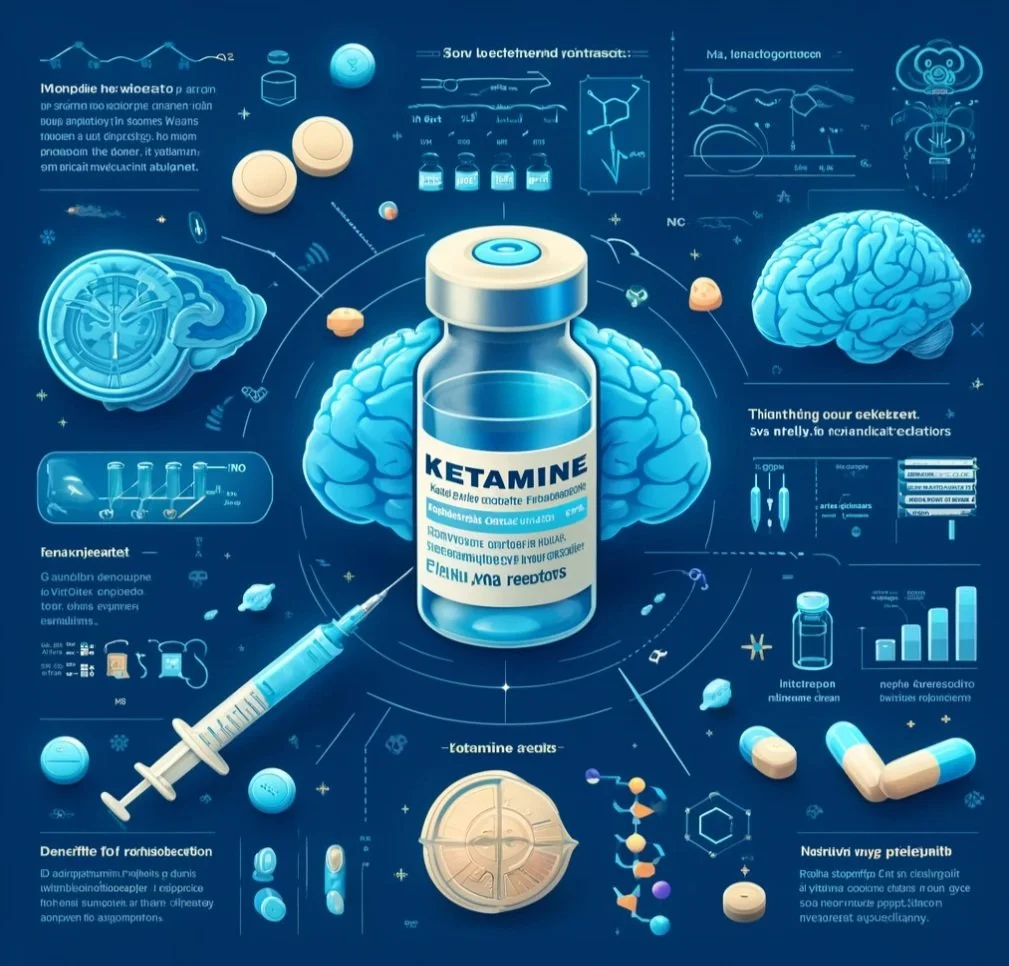Exploring Ketamine’s Role in Eating Disorder Treatment
Eating disorders, such as anorexia nervosa and bulimia nervosa, are complex mental health conditions that can have severe physical and psychological consequences. Traditional treatments, including therapy and medication, often fall short of addressing the underlying issues that drive these disorders. Ketamine therapy—a promising new approach that is showing potential in treating eating disorders by targeting the root causes of mental health problems.
Ketamine, historically known as an anesthetic, has gained attention in recent years for its rapid-acting antidepressant effects. This blog explores how ketamine therapy could revolutionize the treatment of eating disorders, providing relief where traditional methods may not. By the end of this article, you’ll understand the potential benefits of ketamine for eating disorders and be encouraged to consider this innovative treatment option.
Understanding Eating Disorders
Eating disorders, particularly anorexia nervosa and bulimia nervosa, affect millions worldwide. Anorexia is characterized by severe food restriction and an intense fear of gaining weight, while bulimia involves cycles of binge eating followed by purging. Both disorders are associated with high levels of anxiety, depression, and obsessive behaviors, making them challenging to treat.
Anorexia nervosa
An extreme fear of gaining weight, which frequently leads to excessive exercise and drastic weight reduction, is a hallmark of anorexia nervosa. Most people suffering from anorexia do not readily go for treatment, and the majority are often not well informed of the seriousness of the conditions. Recovery often takes time; 1 death in every 5 people with anorexia is reported to be through suicide, and the mortality risk is three times higher in contrast to good psychiatric condition.
Bulimia nervosa
The onset of bulimia nervosa generally follows a period of dieting driven by intense preoccupations with body weight or shape. Individuals with bulimia are deeply ashamed of their actions and are very self-critical about their disorder. The binge-purge cycles may offer them temporary relief from their melancholic feelings and may become a sustained obsession. Above all, eating disorders are better treated the sooner they are identified. Patients who seek treatment within the first five years of the onset of the disorder have the best prognosis for recovery.
Binge Eating Disorder
Binge-eating disorder is much more common compared to anorexia or bulimia. Purging compensatory methods are absent, usually developing after dieting and mostly linked to obesity. Shame and secrecy are very common; people may hide their binge episodes.
The impact of these disorders on mental health is profound. Patients often experience debilitating anxiety, depression, and social isolation. Traditional treatments, such as cognitive-behavioral therapy (CBT) and selective serotonin reuptake inhibitors (SSRIs), aim to address these symptoms but are not always effective for all patients. This is where ketamine therapy offers a new ray of hope.
The Benefits of Ketamine for Eating Disorders
The potential of ketamine to treat eating disorders lies in its ability to address the underlying mental health issues that contribute to these conditions. Real-world examples and patient testimonials support these benefits. For instance, patients who have undergone ketamine therapy often report significant improvements in mood and a reduction in eating disorder symptoms. These anecdotal reports are backed by emerging research, which shows promising results for ketamine as part of a comprehensive treatment plan for eating disorders. For patients with anorexia and bulimia, ketamine therapy offers several potential benefits:
Rapid Symptom Relief: Ketamine’s fast-acting nature means patients can experience relief from debilitating symptoms quickly, which is crucial for those in acute distress.
Rapid Mood Improvement: Ketamine has been shown to offer fast-acting benefits on mood, making it a critical tool in depression and anxiety—conditions that often accompany eating disorders. Traditional antidepressant medications are slow to start showing an effect, but ketamine often provides relief in just 1-2 infusions.
Reduction in Obsessive Thoughts: Ketamine’s impact on neural pathways can decrease the obsessive thoughts about food and body image that characterize eating disorders.
Decreased Suicidal Thoughts: Suicidal thoughts and feelings can be quite problematic for those who are battling eating disorders and mental health issues. Ketamine has been shown to decrease suicidal thoughts and behaviors, offering critical support during the healing process.
Enhanced Cognitive Flexibility: Ketamine works on brain function by enhancing cognitive flexibility, and this may be particularly useful in trying to treat the inflexible thought patterns typical in eating disorders.
Getting Started with Ketamine Therapy
Seeking treatment from a qualified infusion center is crucial if you are thinking about ketamine therapy for an eating disorder. Look for healthcare professionals who specialize in ketamine treatment and have experience working with eating disorder patients.
During your initial consultation, you can expect a thorough assessment to determine if ketamine therapy is suitable for you. Your provider will discuss the treatment process, potential benefits, and any risks involved. Don’t hesitate to ask questions to ensure you’re fully informed before starting therapy.
Some questions to consider asking include:
What is your experience with ketamine therapy for eating disorders?
What can I expect during and after the treatment sessions?
How will my progress be monitored?
Conclusion
Ketamine therapy represents a promising new frontier in the treatment of eating disorders. By targeting the underlying mental health issues that contribute to conditions like anorexia and bulimia, ketamine offers hope for patients who have not found relief through traditional methods. If you or a loved one is struggling with an eating disorder, consider exploring ketamine therapy as a potential treatment option.
References/Resources:
A case series of group-based ketamine-assisted psychotherapy for patients in residential treatment for eating disorders with comorbid depression and anxiety disorders https://link.springer.com/article/10.1186/s40337-022-00588-9
Treatment of compulsive behavior in eating disorders with intermittent ketamine infusions: https://academic.oup.com/qjmed/article/91/7/493/1598067
Research Gate: Ketamine as a Treatment for Anorexia Nervosa: A Narrative Review https://www.researchgate.net/publication/356415134_Ketamine_as_a_Treatment_for_Anorexia_Nervosa_A_Narrative_Review
PubMed: Ketamine as a Novel Psychopharmacotherapy for Eating Disorders: Evidence and Future Directions





